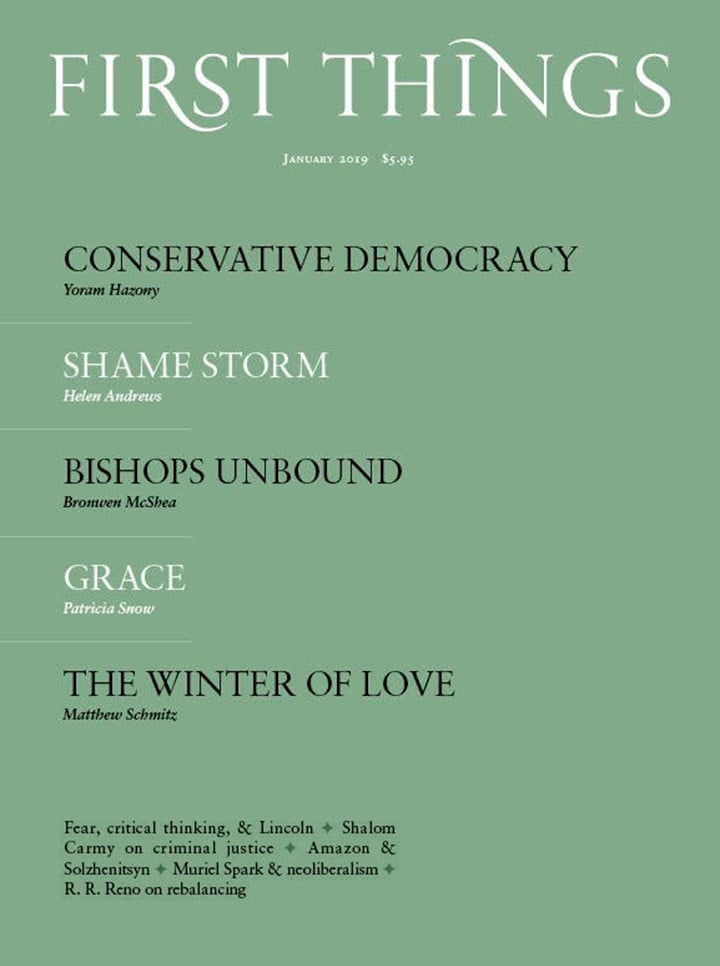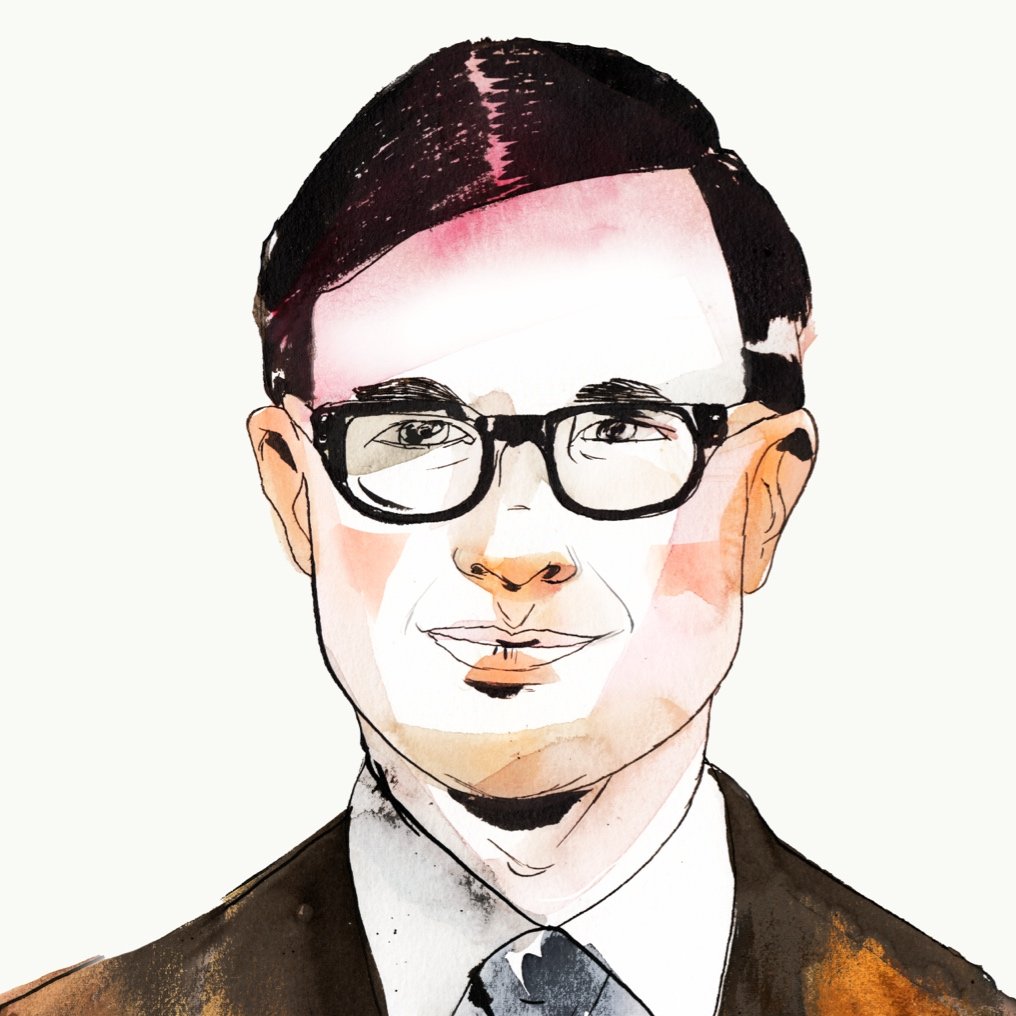No one who welcomed the sixties as a liberation can understand what it has been like to grow up in their wake. Authorities mouth the rhetoric of revolution, shocking slogans have become clichés, and the anthems of Woodstock and Altamont sell sedans to aging Baby Boomers. A banner at the Paris commemoration of the fiftieth anniversary of May 1968 summed up the tedium of unending rebellion: “1968–2018: Revolution!”
Every child of the Boomers has heard the refrain. If you didn’t see Hendrix shred the anthem at Woodstock, if you didn’t march at Selma, if you didn’t get laid beside the barricades or see the opening of Vatican II, you have never been as young as your elders once were. Some time around the thirty-third deluxe reissue of The White Album, I realized I’d had enough.
Insofar as they represent the Boomer stranglehold on our common life, and notwithstanding their merits, I hate: Dylan, The Stones, The Beatles, peace, sex, spontaneity, marijuana, T-Birds, open minds, casual Fridays, interfaith prayer, options, sneakers, love, Coca-Cola, Apple, the Clintons, coalitions of the willing, brotherhood, blue jeans, rights, Bonnie and Clyde, creative destruction, tolerance, Harley-Davidson, C. Wright Mills’s leather jacket, diversity, innovation, corporate responsibility, Eucharistic Prayer II, Rolling Stone, Live Aid, dialogue, liberty, nudity, Princess Di, free speech, travel, open floor plans, Viagra, Fender Musical Instruments Corporation, privatization, authenticity, the environment, t-shirts, smiles, and RFK.
I was lucky. Shortly before I was born, my parents burned their LPs under the influence of a preacher named Bill Gothard. Say what you will about the man, he saved me from hearing “Revolution 9” in place of lullabies. But no child of the Boomers has been altogether spared. For fifty years, we have been forbidden to forbid. Daniel Cohn-Bendit has called the 68ers “left-wing libertarians,” but they have been happy to wield power as they denounce authority. Their ideological Yalta dictates that the left controls the culture and the right controls the economy, each liberalizing its own sphere.
Instead of rejecting this settlement, my generation has pathetically reenacted 1968. At the anti-war demonstrations in 2003, and later at Occupy Wall Street, young people dressed up in tie-dye, tribal prints, and Indian headbands—borrowed nostalgia for the unremembered sixties.
But these would-be radicals were harmless compared to the supposedly responsible, centrist Boomers who have worked to advance a borderless world. Six days after the bombing of Baghdad began, Tony Blair wrote to George W. Bush: “Our ambition is big: to construct a global agenda around which we can unite the world.” (As it happened, the only form of global unity that took root in Iraq was the universal caliphate.) When Germany faced an unprecedented influx of migrants in 2015, Angela Merkel reassured worried voters, “We can do this.”
Václav Havel glimpsed the world these Boomers dreamed of when he arrived at the Paris airport in May 1968 and found the security guards on strike. “The barriers between East and West collapsed,” his biographer writes. “Borders were meaningless. Identity papers were obsolete. Surveillance was just a word. Nobody asked questions. The distinction between citizen and alien, between insider and outsider, was struck down.”
What a beautiful vision! Alas, as Richard Vinen has shown, Havel was in fact in New York at the time, and so could not have witnessed this eschatological inbreaking of a borderless world. But that has not stopped Europe’s leaders from trying to make his fantasy real. From the invasion of Iraq to the invitation of untold numbers of migrants, Boomers have acted as if culture, religion, and boundaries do not matter. They have sought to efface the distinction between citizen and alien, home and abroad. Annoying as all Boomer fixations are, this one has proved the most dangerous.
Already in 1968, there was resistance—not only from the right, but from the working-class left. At the hard hat riot in New York, union members clashed with students while chanting, “All the way, USA” and “America, love it or leave it.” At the burial of two IRA fighters, IRA leader Jimmy Steele gave a speech lamenting that Irish nationalism had come to be equated with fascism, and that “one is expected to be more conversant with the teachings of Chairman Mao than those of our dead patriots.” He reminded the assembly that the dead men were “not intellectuals” but “ordinary working-class lads.”
Steele was rebuking the young radicals whom Alasdair MacIntyre witheringly called “idealized students who have produced the first parent-financed revolts in what is more like a new version of the children’s crusade than a revolutionary movement.” Unfortunately, Steele lost the argument. The American intellectual C. Wright Mills urged leftists to shift away from the working class and toward the “new generations of intellectuals” around the world. Intellectual, globe-spanning, upper-class: Mills discerned the true outlines of the New Left.
Nowadays, men like Steele and MacIntyre are perceived as being on the right. As Alan Brinkley notes, “some on the left came to identify the working class not as a potential ally but instead as one of their most powerful and least redeemable enemies.” After one pro-war demonstration by union members, a radical journalist in Berkeley wrote, “The next time some $3.90-an-hour AFL-type workers go on strike for a 50-cent raise, I’ll remember the day they chanted ‘Burn Hanoi not our flag,’ and so help me, I’ll cross their f***ing picket line.”
For the New Left, nationalism became the greatest sin. Whoever expresses it forfeits his membership in the greater moral community. The distinction between citizen and alien is replaced by that between the enlightened and the deplorable. One sees it in The Capital, the new novel by Robert Menasse, which portrays the Brussels Eurocrat in a positive—even heroic—light. Being a novel about modern-day Europe, it naturally turns on a terrorist plot hatched by a religious fanatic. Only the terrorist is not an Islamist born in the banlieues, and certainly not a Mideastern migrant, but a Polish Catholic nationalist. The real threat to Europe!
Are the nationalists really so dangerous? In order to find out, I went to Poland to witness its annual Independence March, the largest gathering of nationalists in the world. There were some fascist banners and unsavory characters in the crowd. They should have been excluded, just as the communist banners should have been excluded from the anti-war protests I attended as a teen. But the overwhelming majority of attendees were patriotic Poles with a perfect hatred for Nazis and Commies alike.
“We are revolting against the 68ers who don’t want to let go of power,” Stefan Tompson told me. Like several of the young men who lead Poland’s nationalist movement, Tompson grew up abroad and attributes his opposition to migration to his experience of the underside of multiculturalism, what he calls “integration from below.” It’s the same for Adam Starzynski, who grew up in Malmö, the most Muslim city in Sweden, and thought of himself as Swedish until age fifteen, when he visited his grandparents in Poland.
“It sounds stupid, but something happened when I was throwing out some trash,” he told me. “It hit the edge of the bin and fell on the ground. I was turning away when I had a sudden thought that this was the territory for which my grandfather had fought alongside the French. It was just a moment, but I stopped and put the trash in the bin.”
He doubts that he ever fit in among the Swedes. “If you were over at the house of your Swedish friends, their parents would give you toys to play with while their children ate, but they wouldn’t invite you. I don’t know why. My Iranian, Pakistani, and Colombian friends said the same thing. Maybe they were worried about allergies.”
Earlier this year, Walter Kirn wrote, “The right wing summer of love is almost upon us.” He meant, I think, that we are approaching a true counterpoint to 1968, a moment at which a new ethos comes into being, with young people and rockers kicking off the anti-Boomer festivities.
At the end of the Polish Independence March, the crowd assembled before a large stage. The cold November air grew warm as thousands of revelers crowded together, lit red flares, and swayed to the unmelodic strains of a nationalist metal band. “God! Honor! Fatherland!” the crowd chanted. “Ave Christus Rex!” Next to me, a young man embraced his girlfriend, who had begun to shiver in the cold. Another couple locked arms and spun around, as the girl held up the Polish flag. One felt that electric mix of political radicalism and personal release that young radicals have been chasing for decades, like a first high. It was Woodstock in reverse, a sign that, fifty years on, the spirit of 1968—open minds, open borders, open legs—has begun to fade. Call it the winter of love, a season when people draw together with kith and kin and shut the door against the cold.
Matthew Schmitz is senior editor of First Things and a Robert Novak Journalism Fellow.
In Praise of Translation
This essay was delivered as the 38th Annual Erasmus Lecture. The circumstances of my life have been…
Work Is for the Worker
In these early days of his pontificate, Pope Leo XIV has made one thing clear: The responsible…
Goddity
The Nativity of our Lord—born an infant, laid in a manger. It’s an utterly strange story: The…



